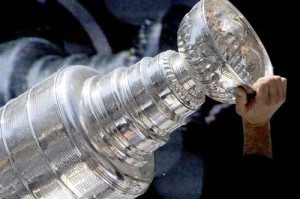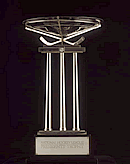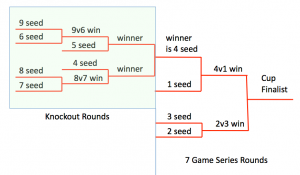The Stanley Cup playoffs are among the best events in sports. Sure you get an occasional mismatch, but there is more compelling drama in the NHL playoffs than in any other professional sports playoff system.
 Still, one should ask, why spend 82 games figuring out who the top 16 teams are out of 30? That is a lot of hard work to eliminate less than half the field. And why should a team that finished first, making it nominally the best team in hockey, be given such a miniscule advantage, home ice in game 7, over a team that is literally middle of the pack? Once a team crosses the 100 point mark, the remainder of their regular season is essentially meaningless. That is not good.
Still, one should ask, why spend 82 games figuring out who the top 16 teams are out of 30? That is a lot of hard work to eliminate less than half the field. And why should a team that finished first, making it nominally the best team in hockey, be given such a miniscule advantage, home ice in game 7, over a team that is literally middle of the pack? Once a team crosses the 100 point mark, the remainder of their regular season is essentially meaningless. That is not good.
So far this year, there have been five 7-game series. Two won by the home team (higher seed), the other 3 won by the road team (lower seed). Last season, 7 series went to 7 games, the lower seed won 6 of 7. Over the last two years, the game-7 home teams are 3-9. The “advantage” of having a higher seed and getting home ice for a game 7 is not a significant advantage.
Of the 4 major sports in North America, 2 sports give teams a meaningful postseason advantage for a strong regular season (NFL, MLB) and 2 do not (NBA, NHL).
So here goes, suggestions that will take the perfection that is the Stanley Cup playoffs into something better.
Something Simple
The simple approach has two parts. First, give the top teams in each conference the choice of their first round opponent. Don’t simply select the lowest ranked team in the standings. The lowest seed could be a hot team, a team that picked up a major player at the trade deadline, or simply a poor match-up for the top seed. Let the winner make the call on who they want to play from among the bottom 4 seeds. This can be extended; after the top seed has made a choice, the 2nd seed gets to select their opponent, followed by the 3rd seed selecting theirs. It is sure to make things more interesting. If the season finishes on Saturday, I could see an hour-long show on Sunday to do the selecting. The best team has earned the right to play the weakest opponent, they should decide who they think that is.
The second part is to give the team with the best record more home games. Award 5 home games for the 7-game series, not just 4. Give them that advantage for both round 1 and round 2. For the second place finisher, give them 5 home games for round 1 only.

Is anyone in hockey really motivated to win a President’s Trophy? Did you even know what it looked like before seeing it in this article? As more and more organizations recognize how little value the regular season holds beyond making the playoffs (or tanking for a high draft spot if you are on the other end), you can start expecting the better teams to use the regular season as a tune-up for the postseason instead of driving to capture every last regular season point.
The NBA playoff structure is similar to the NHL. We’ve seen coaches routinely take star players out of their everyday line-up in order to keep them rested. Gregg Popovich of the San Antonio Spurs did this to much criticism and was even fined by the league. Popovich has won 5 NBA championships. He is the one laughing last. Steve Kerr did that this season and his Golden State Warriors team is in the NBA Finals. The NBA has the same issue, except for one point. At least in the NBA, being at home for game 7 is an advantage. Home teams in game 7 in the NBA are 6-1 over the last 2 years, not 3-9 as in the NHL.
Every year, you can hear coaches and players on teams with over 100 points talking about the importance of the next game and the ‘critical 2 points’ at stake. Those 2 points are not critical. They are almost meaningless. These change proposed make those points meaningful again.
For the NHL regular season to stay credible, regular season success needs to offer more than it does for the top teams. 82 games to decide which 16 teams are in, with only modest tangible benefit to the top team in versus the 16th team in, makes no sense.
A More Drastic Approach
There are other, more drastic ways to shake up the postseason tourney which give higher seeds more reward for their success.
I’ll describe an 18 team format whose most important characteristic is that the higher you finish, the more benefits you get to carry into the postseason. In the simple proposal, the benefits were real, though modest. In this proposal, the benefits are more substantial, the regular season becomes far more meaningful. It is a hybrid format, using knock-out games during the first week and the standard best-of-7 series thereafter.
Take the top 3 teams in each conference and give them the first week off. For their regular season success, they automatically advance to the equivalent of round 2. Both MLB and the NFL have a type of first round ‘bye’ for their top finishers. This format somewhat resembles major league baseball, which uses a knock-out game (1 game in each league) between the 4th and 5th seeds to decide which team goes on to the division series round. In this NHL scenario, there are more teams, and therefore more knock-out games.

While 3 teams in each conference get the week off, the remaining 6 teams in each conference, seeds 4-9, enter a series of knock-out games. The survivor of the knock-out rounds is awarded the fourth overall seed in each conference. One can look at each knock-out game as a game 7 equivalent: lose and you are done. If anyone needs to wonder if the drama of a densely packed, knock-out style tourney is compelling, it is what the NCAA’s basketball tournament uses. Its called March Madness and it is wonderfully mad. No reason the NHL couldn’t find a week for April Insanity.
For the first knock-out round, have the 6th seed host the 9th seed in one game, and the 7th seed host the 8th seed in the other. The winners advance to round 2 of the knock-outs. The 4th and 5th seeds each host a round 1 winner. The 2 winners of the round 2 knock-out matchups play each other for the 4th seed and the right to enter the series rounds.
The knock-out rounds are finished in under a week. This year, the season ended on a Saturday, the knock-out round games could happen on Monday, Wednesday and Friday, giving the top seeds much deserved rest and a pass into what is currently the playoff’s second round. The knock-out games replace the current format’s opening round. After the knock-out games are done, the playoffs are identical to what they are now.
An added benefit is that the NHL season would end about 10 days earlier. Players for teams that go deep in the playoffs would have a bit less wear and tear along with a bit more offseason to recover. As much as I enjoy hockey, the season should be over before mid-June.
Most importantly, there is considerable benefit to advancing in the regular season standings. The teams that squeak into the 8th and 9th spots have a very difficult path, needing to win 3 straight games (likely all on the road) to get that 4th seed spot. The 6th and 7th team host the first round knock-out games, a modest advantage over the teams behind them. The 4th and 5th seeds get to skip the first knock-out games completely, then get home ice for the second round knock-out games, a distinct advantage over the 6-9 seeds. The top 3 seeds avoid the knock-out rounds completely. The better your regular season, the better off you are for the playoffs.
Another Option
The NHL regular season exists to eliminate slightly less than half the teams from the playoffs. A lengthy and very physical regular season needs to be about more than that. Football and baseball both eliminate about 2/3 of the teams. If the regular NHL season is not that meaningful, shorten it. Cut the season back to 66 games.
Whether there is minor tweaking or something more drastic, it is in the NHL’s interest to make the regular season more valuable than it is now. It can also make the ‘perfect’ Stanley Cup playoffs, even better.